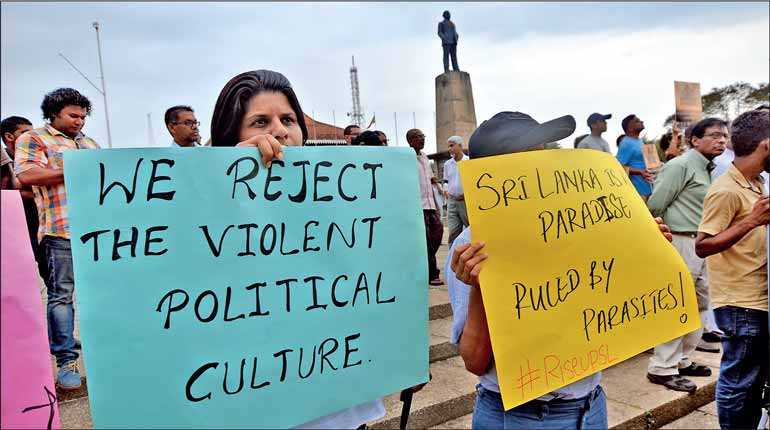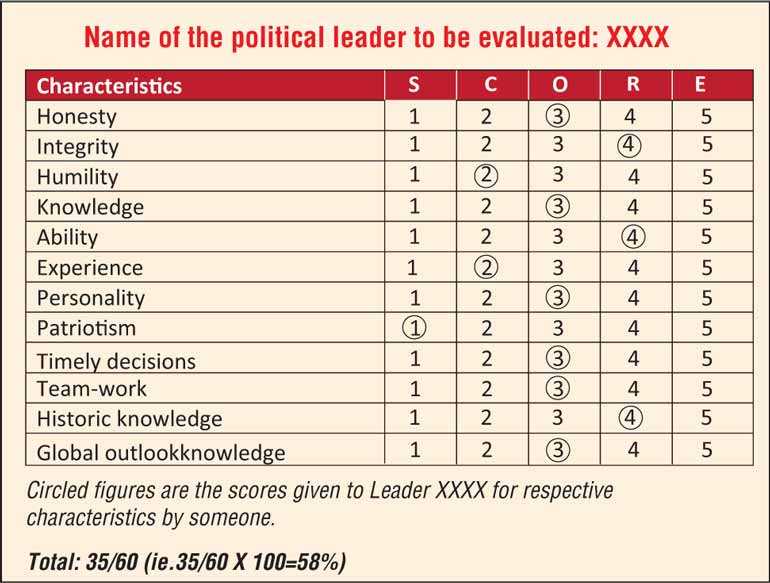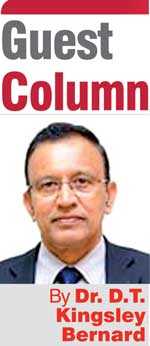Friday Feb 20, 2026
Friday Feb 20, 2026
Saturday, 12 October 2019 00:00 - - {{hitsCtrl.values.hits}}


Leadership is a subject which has been researched the most in management, yet difficult to understand and practice due to its complex nature. Let me initially introduce leadership in general and to consider a few statements made by management experts about the subject.
According to John Adam, “If your action inspires others to dream more, learn more, do more and become more, you are a leader.” In other words, someone to get to this status, a leader has to provide his followers or team members a conducive environment to be motivated and deliver their best to achieve the goals and objectives of the team.
Lombardi (2001) said: “Self-knowledge is the basis for character and character is the root of integrity and integrity provides the foundation for leadership.” This statement highlights the importance of knowledge, character, and integrity to become a good leader. He further goes on to state that leadership is the ability to direct people and more importantly to have those people to follow that direction.
If I may also quote Peters and Austin (1985): “Leadership that pulls together people with diverse talents, backgrounds, experiences and interests, encourages them to step up to responsibility and continued achievement, and treats them as full scale partners and contributors.”
It is all about the ability to work in teams, with a team spirit, that would ultimately provide for continuous improvement. The emphasis is on really paying attention to people-really believing them, caring about them and really involving them.
Vital characteristics of a leader
Having considered the above statements of experts, let us take a practical approach to consider what qualities and skills a person should possess to be an effective leader. According to past researchers some of the vital characteristics of a leader are; ability, knowledge and experience along with honesty, integrity, and humility which adds up to a leader’s personality.
One can go on expanding this list, however these characteristics are comprehensive enough to mould one to be a good leader. These characteristics are common attributes of a successful leader, hence the need to evaluate these characteristics in political leaders, for they play a vital role in nation building.
Honesty: The quality of being honest and trustworthy. An important characteristic of quality leaders, which helps command the respect of people and their confidence. It is of prime importance in the assessment of political leaders. If found dishonest, there is little else of any importance in the assessment of a good leader. Honest leaders are today at a discount.
Integrity: The uncompromising adherence to strong moral and ethical principles. In ethics integrity is regarded as honesty and truthfulness. It is the opposite of hypocrisy.
Humility: Being humble. The absence of pride and arrogance in a good leader. This again is a rare quality in most of the present day leaders. They are proud and arrogant.
Knowledge: The theoretical and practical understanding of any subject acquired through education and experience. Acquired skills of importance in performance, this could be of the society, culture, economy, and specially constitution and laws of the land which are prerequisites for any political leader, the presence of which would help to guide his or her followers. As has been said a leader’s evaluation is based on his/her knowledge of the subject matter.
Ability: The quality or state of being able. A natural aptitude or acquired proficiency. Both physical ability and mental ability are of importance. Hence, the age, health, and mental fitness are real concerns for any political leader. It is quite natural that functions of certain faculties deteriorate with age.
Experience: Knowledge gained through direct observation or participation in a particular activity or job. Experience and expertise are like the two sides of a coin. One cannot be replaced by the other. Experience in political affairs is an asset to any political leader, as exposure to many different situations will definitely enhance the confidence of facing similar or different situations in the future.
Personality: The combination of all the above characteristics which forms an individual’s distinctive character. The uniqueness of an individual, distinct from the rest and likely to arouse emotional feelings in the minds of the followers of any leader.
Having stated most of the important characteristics of a good leader let me now discuss some specific characteristics of a political leader.
Priorities of a political leader
The first priority of a political leader should be to serve one’s country, not just oneself. Despite the fact that politics can be competitive and at times dirty, a good leader should align his activities with what is best for the country strictly committing to “country before self”. Hence, a political leader should be able to make unpopular decisions if necessary in the interest of the nation. To state differently, a leader must be patriotic.
Secondly, a leader should know experts in specific fields and who can be trusted. Most importantly a leader should know when it is better to trust an expert and when it is necessary to do one’s own investigations. Leader should have the right skills for taking appropriate and timely decisions based on good judgement.
Thirdly, a political leader should know the strengths and more importantly the weaknesses of democracy yet one should respect and listen to his followers in leading them and promote shared responsibility and team-work
Fourthly, a political leader should be knowledgeable about the history not only of one’s own country, but also of other important countries. Not only a basic knowledge about past events, but he should know much more than an average citizen.
Finally, a political leader should have travelled extensively, attending important meetings of use to the country, not merely for personal benefit. This is important as the leader can develop useful networks and acquaintances with other leaders of international standing. In other words a leader should have a global outlook.
7 common characteristics and 5 specific characteristics
Now that we have considered the vital characteristics of a good leader and it is quite natural that no leader has all these characteristics in adequate quantities. As human beings this will pose a problem on how to select the best out of political leaders who present themselves, for a Presidential Election, which is now the most pertinent issue for the Sri Lankans.
It is my objective to present a simple mechanism for this purpose based on the above discussed characteristics of political leaders based on sound theoretical concepts and expert views.
I have referred to seven (7) common characteristics and five (5) specific characteristics of a good political leader. The premise behind this simple method is to give scores to these twelve (12) characteristics by assigning points varying from 1 to 5 depending on how best a particular candidate fares in relation to each of these 12 characteristics (1- poor to 5-excellent) according to your own judgement and add all these points in respect to each candidate you wish to evaluate.
Finally the candidate who scores the highest number of points should logically be better than the others.
Following matrix (table) will explain the above mentioned method.
Matrix (table) for evaluation
In the example shown in the table, leader XXXX has scored 58% and you can repeat the same exercise for any number of leaders (candidates) and compare the scores which will facilitate you to select the best out of candidates presenting them for leadership. However you may limit this exercise for a small number (3 to 5) of candidates whom you wish to consider for leadership than doing the exercise for a large number of candidates as it is a waste of time.
This matrix (table) can be further developed by giving weightages to each characteristics if someone thinks all the characteristics are not equally important. Further you can also add more characteristics to the matrix. This simple matrix will offer a logical basis for evaluating candidates for their suitability for leadership using your own understanding. The judgement of each individual on these characteristics in respect to a particular leader may vary and to some extent there is a subjective element in the method of evaluation. However, that is the way that we make decisions in our daily life and we are not always rational.
The purpose of this short article is to highlight the importance of leadership as we know the progress of any nation depends largely on political leaders and their followers as the history bears testimony to leaders such as Nelson Mandela, Dr. Mahathir Mohamed and so many others. These successful leaders had possessed the qualities discussed in this article to a very high degree.
The researchers have concluded that most successful leaders have very high level of Emotional Intelligence thereby they had properly understood their own self and that of others. As a result these leaders had developed strong interpersonal relationships and conducted their own affairs excellently. This article further goes on to introduce a simple method to follow in making an informed and logical decision in making this serious decision in selecting a leader for our nation without being a slave to our emotions.
[The writer is a Doctor of Philosophy (PhD) in Business Management awarded by the Management and Science University (MSU) of Malaysia. A holder of an MBA from the University of Colombo with a gold Medal for Marketing Management and Post Graduate Diploma from the International Marketing School of Colorado State University, USA; Diploma in Computer Systems Design from CICC-Japan and a Bachelor of Science (BSc) from the University of Jaffna. He is currently the Chairman of the Council for Agricultural Research Policy (SLCARP) and is a Senior Lecturer attached to the Faculty of Business, Sri Lanka Institute of Information Technology (SLIIT). He counts more than 38 years of industry experience spanning to various sectors during which he has held top management positions both in private and public sector organisations. He had lead National Chamber of Exporters (NCE) as its president and was the chairman of the Joint Business Forum during 2004-2006. He was the District Governor of Lions International, District 306 B2 in 2009/2010 and was the first Students’ Council President of the University of Jaffna.]